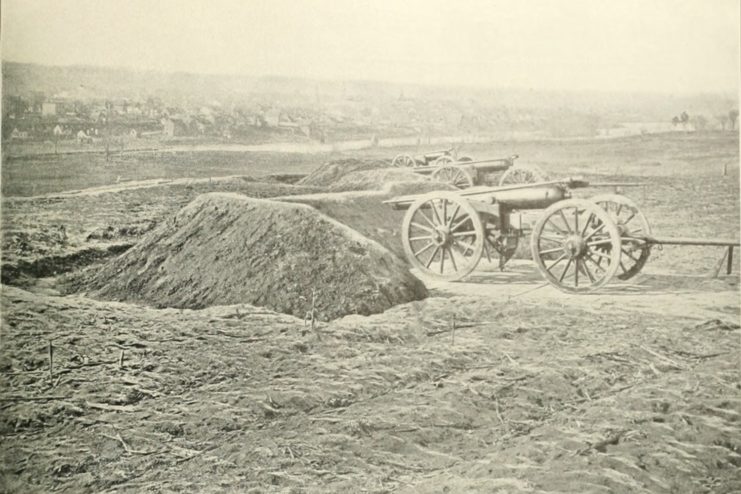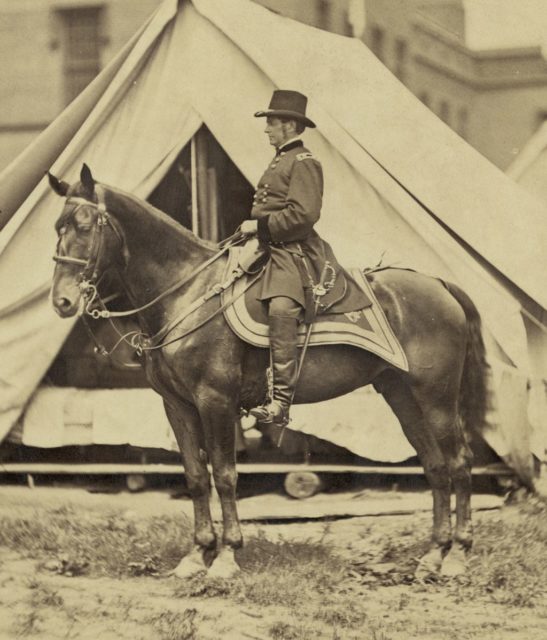Few American Civil War commanders were as contentious, either in war or its aftermath, as Fighting Joe Hooker. After months of grumbling at the failures and indecisiveness of other commanders, he failed to live up to the aggressive spirit he had promised.
Fighting Joe had good reason to believe he would do better than the men he served under, and nowhere was it better shown than at the Battle of Fredericksburg.
Bad Blood in the Union Ranks
As Union and Confederate forces approached Fredericksburg in December 1862, tempers were already fraying among the Union officers. Ambrose Burnside, commanding the Army of the Potomac, had annoyed his officers, including Hooker, with his poor planning. His proposal to cross the river in the face of Robert E. Lee’s Confederate troops was met with incredulity by his subordinates.
Hooker’s mood grew worse during initial crossings of the river. His two best divisions were detached from his command so they could support General Franklin as they crossed the river. The hot-headed Hooker was becoming increasingly impatient.
A Half-Hearted Start
Union troops built pontoon bridges and began crossing the Rappahannock River into Fredericksburg. Hooker, Burnside, and General Sumner watched from the roof of Lacy House, on a ridge amid their artillery.
Burnside had never wanted high command. He did not believe he was the man for the job. His lack of confidence showed in his handling of the troops. The mighty Army of the Potomac advanced in pieces, rather than using its superior numbers to overwhelm Lee. Watching the debacle was frustrating for Hooker.

A Futile Attack
Burnside sent forces forward to try to break the Confederate force on the right. It was a terribly misjudged attack. The Confederate General Longstreet, holding strong defensive positions on Marye’s Heights, pounded the Union troops as they advanced. Sumner’s forces walked into a slaughter.
Burnside, intent on his plan, ordered Hooker to advance in support of Sumner. The incredulous Hooker tried to talk him out of it, but Burnside was not to be dissuaded. Hooker sent his men to the attack. The results were as unsurprising as they were bloody. Seeing the carnage, Hooker stormed down from his vantage point to the battlefield, where he rearranged artillery to support his troops.
At last, he halted the advance of his infantry. He later justified his actions in terms implicitly damning of Burnside: “Finding that I had lost as many men as my orders required me to lose, I suspended the attack.”
Not Allowed to Withdraw
Toward sundown on December 13, the Second Corps was holding an advanced picket line. Hooker believed the action was folly as the troops were left exposed for no good reason. Burnside believed that to abandon the position would be to admit defeat. Hooker tried to persuade his superior, but it was no use. If thousands of casualties could not change Burnside’s mind, then the haranguing of his subordinate was certainly not going to do the job.

A Miserable Night
That night, Hooker was given command of the Union troops inside Fredericksburg.
The men crowded together in the town were miserable. They were the remnants of battered formations; many remained shaken by the terrible beating they had taken that day. They feared Confederate artillery would open fire upon them or that another assault would smash into them there.
Meanwhile, the wounded lay on the slopes beneath Marye’s Heights, freezing in the winter cold, their cries of misery drifting down to their nervous comrades.
Talking Burnside Down
The next morning, as the troops dug in around the town, Hooker was among the officers gathered by Burnside for a council of war.
What followed was a reflection of just how far Burnside’s mood had fallen and of just how right he was in saying that he was the wrong man for the job. He put forward a desperate plan, intended to vindicate his character as much as to bring victory. He would personally lead a fresh assault on Marye’s Heights.
The Heights were a fantastic defensive position, the plan an act of stubbornness which would have cost countless lives. Burnside’s commanders managed to talk him out of it.
Hooker believed they could break the Confederates. By attacking with a massive column at night, they could avoid the fire of the Confederate artillery and break the enemy lines. His colleagues were less confident. They believed the battle had already been lost. Hooker was frustrated in his plans once more.
The Union troops retreated, holding onto Fredericksburg as a symbolic act of defiance.

Retreat and Resentment
Hooker still found things to aggravate him. 12,000 troops of the Center Grand Division were to hold onto Fredericksburg. Hooker could see the men were exhausted and the presence of so many there, pointless. He wanted to pull more of them out. He also wanted to send out a flag of truce, to arrange the retrieval of the Union dead.
Burnside would accept no white flags. It was too close to an admission of defeat. However, he allowed Hooker to remove more of the troops.
Within two days of the war council, any pretense of holding the town was abandoned. Hooker and the last Union troops withdrew, leaving behind 13,000 casualties, to only 4,000 on the Confederate side.
Testimony to the Committee
Fresh from this defeat, the enraged Hooker went to Washington to appear before the Joint Congressional Committee on the Conduct of the War. There, he was damning of both Burnside and Franklin, who had led the initial attack on the Heights.
Burnside was politically protected, so Franklin took the blame. In the new year, the weak Burnside was finally removed from authority.
Hooker took his place, sure in the knowledge, he could have achieved victory at Fredericksburg. He felt vindicated. However, when his chance came at Chancellorsville, he did no better.
